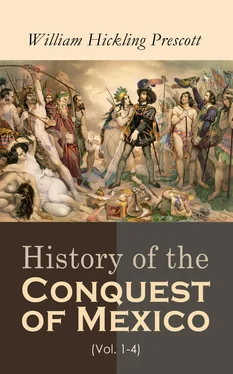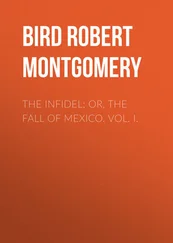He then withdrew to his rural palace of Tezcotzinco, where he remained forty days, fasting and praying at stated hours, and offering up no other sacrifice than the sweet incense of copal, and aromatic herbs and gums. At the expiration of this time, he is said to have been comforted by a vision assuring him of the success of his petition. At all events, such proved to be the fact; and this was followed by the cheering intelligence of the triumph of his arms in a quarter where he had lately experienced some humiliating reverses. [326]
Greatly strengthened in his former religious convictions, he now openly professed his faith, and was more earnest to wean his subjects from their degrading superstitions and to substitute nobler and more spiritual conceptions of the Deity. He built a temple in the usual pyramidal form, and on the summit a tower nine stories high, to represent the nine heavens; a tenth was surmounted by a roof painted black, and profusely gilded with stars, on the outside, and incrusted with metals and precious stones within. He dedicated this to “ the unknown God, the Cause of causes ” [327]It seems probable, from the emblem on the tower, as well as from the complexion of his verses, as we shall see, that he mingled with his reverence for the Supreme the astral worship which existed among the Toltecs. [328]Various musical instruments were placed on the top of the tower, and the sound of them, accompanied by the ringing of a sonorous metal struck by a mallet, summoned the worshippers to prayers, at regular seasons. [329]No image was allowed in the edifice, as unsuited to the “invisible God;” and the people were expressly prohibited from profaning the altars with blood, or any other sacrifices than that of the perfume of flowers and sweet-scented gums.
The remainder of his days was chiefly spent in his delicious solitudes of Tezcotzinco, where he devoted himself to astronomical and, probably, astrological studies, and to meditation on his immortal destiny,—giving utterance to his feelings in songs, or rather hymns, of much solemnity and pathos. An extract from one of these will convey some idea of his religious speculations. The pensive tenderness of the verses quoted in a preceding page is deepened here into a mournful, and even gloomy, coloring; while the wounded spirit, instead of seeking relief in the convivial sallies of a young and buoyant temperament, turns for consolation to the world beyond the grave:
“All things on earth have their term, and, in the most joyous career of their vanity and splendor, their strength fails, and they sink into the dust. All the round world is but a sepulchre; and there is nothing which lives on its surface that shall not be hidden and entombed beneath it. Rivers, torrents, and streams move onward to their destination. Not one flows back to its pleasant source. They rush onward, hastening to bury themselves in the deep bosom of the ocean. The things of yesterday are no more to-day; and the things of to-day shall cease, perhaps, on the morrow. [330]The cemetery is full of the loathsome dust of bodies, once quickened by living souls, who occupied thrones, presided over assemblies, marshalled armies, subdued provinces, arrogated to themselves worship, were puffed up with vainglorious pomp, and power, and empire.
“But these glories have all passed away, like the fearful smoke that issues from the throat of Popocatepetl, with no other memorial of their existence than the record on the page of the chronicler.
“The great, the wise, the valiant, the beautiful,—alas! where are they now? They are all mingled with the clod; and that which has befallen them shall happen to us, and to those that come after us. Yet let us take courage, illustrious nobles and chieftains, true friends and loyal subjects,— let us aspire to that heaven where all is eternal and corruption cannot come . [331]The horrors of the tomb are but the cradle of the Sun, and the dark shadows of death are brilliant lights for the stars.” [332]The mystic import of the last sentence seems to point to that superstition respecting the mansions of the Sun, which forms so beautiful a contrast to the dark features of the Aztec mythology.
At length, about the year 1470, [333]Nezahualcoyotl, full of years and honors, felt himself drawing near his end. Almost half a century had elapsed since he mounted the throne of Tezcuco. He had found his kingdom dismembered by faction and bowed to the dust beneath the yoke of a foreign tyrant. He had broken that yoke; had breathed new life into the nation, renewed its ancient institutions, extended wide its domain; had seen it flourishing in all the activity of trade and agriculture, gathering strength from its enlarged resources, and daily advancing higher and higher in the great march of civilization. All this he had seen, and might fairly attribute no small portion of it to his own wise and beneficent rule. His long and glorious day was now drawing to its close; and he contemplated the event with the same serenity which he had shown under the clouds of its morning and in its meridian splendor.
A short time before his death, he gathered around him those of his children in whom he most confided, his chief counsellors, the ambassadors of Mexico and Tlacopan, and his little son, the heir to the crown, his only offspring by the queen. He was then not eight years old, but had already given, as far as so tender a blossom might, the rich promise of future excellence. [334]
After tenderly embracing the child, the dying monarch threw over him the robes of sovereignty. He then gave audience to the ambassadors, and, when they had retired, made the boy repeat the substance of the conversation. He followed this by such counsels as were suited to his comprehension, and which, when remembered through the long vista of after-years, would serve as lights to guide him in his government of the kingdom. He besought him not to neglect the worship of “the unknown God,” regretting that he himself had been unworthy to know him, and intimating his conviction that the time would come when he should be known and worshipped throughout the land. [335]
He next addressed himself to that one of his sons in whom he placed the greatest trust, and whom he had selected as the guardian of the realm. “From this hour,” said he to him, “you will fill the place that I have filled, of father to this child; you will teach him to live as he ought; and by your counsels he will rule over the empire. Stand in his place, and be his guide, till he shall be of age to govern for himself.” Then, turning to his other children, he admonished them to live united with one another, and to show all loyalty to their prince, who, though a child, already manifested a discretion far above his years. “Be true to him,” he added, “and he will maintain you in your rights and dignities.” [336]
Feeling his end approaching, he exclaimed, “Do not bewail me with idle lamentations. But sing the song of gladness, and show a courageous spirit, that the nations I have subdued may not believe you disheartened, but may feel that each one of you is strong enough to keep them in obedience!” The undaunted spirit of the monarch shone forth even in the agonies of death. That stout heart, however, melted, as he took leave of his children and friends, weeping tenderly over them, while he bade each a last adieu. When they had withdrawn, he ordered the officers of the palace to allow no one to enter it again. Soon after, he expired, in the seventy-second year of his age, and the forty-third of his reign. [337]
Thus died the greatest monarch, and, if one foul blot could be effaced, perhaps the best, who ever sat upon an Indian throne. His character is delineated with tolerable impartiality by his kinsman, the Tezcucan chronicler: “He was wise, valiant, liberal; and, when we consider the magnanimity of his soul, the grandeur and success of his enterprises, his deep policy, as well as daring, we must admit him to have far surpassed every other prince and captain of this New World. He had few failings himself, and rigorously punished those of others. He preferred the public to his private interest; was most charitable in his nature, often buying articles, at double their worth, of poor and honest persons, and giving them away again to the sick and infirm. In seasons of scarcity he was particularly bountiful, remitting the taxes of his vassals, and supplying their wants from the royal granaries. He put no faith in the idolatrous worship of the country. He was well instructed in moral science, and sought, above all things, to obtain light for knowing the true God. He believed in one God only, the Creator of heaven and earth, by whom we have our being, who never revealed himself to us in human form, nor in any other; with whom the souls of the virtuous are to dwell after death, while the wicked will suffer pains unspeakable. He invoked the Most High, as ‘He by whom we live,’ and ‘Who has all things in himself.’ He recognized the Sun for his father, and the Earth for his mother. He taught his children not to confide in idols, and only to conform to the outward worship of them from deference to public opinion. [338]If he could not entirely abolish human sacrifices, derived from the Aztecs, he at least restricted them to slaves and captives.” [339]
Читать дальше












